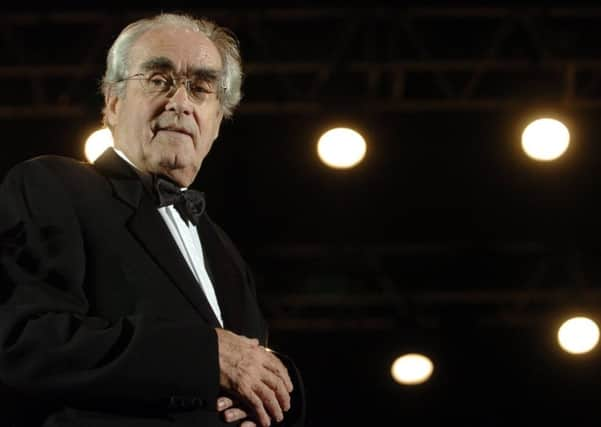Michel Legrand


Michel Legrand enrolled at the Paris Conservatoire at the age of ten, he composed classical music, conducted, played piano, worked with such legendary names as Iggy Pop and Miles Davis and performed at the Glasgow Jazz Festival in 2011. But it was with film music that Legrand achieved his greatest success, working on more than 200 films and television shows and winning three Oscars.
He once remarked that he was so busy that he found it difficult to make time to actually watch the films.
Advertisement
Hide AdAdvertisement
Hide AdSometimes his songs became more famous than the films. What Are You Doing the Rest of Your Life? became a standard, recorded by Frank Sinatra, Peggy Lee, Shirley Bassey and Andy Williams, though few would be able to name the film in which it first featured. For the record, it was The Happy Ending (1969).
The Windmills of Your Mind, however, is a classic in a classic, perfectly matching the feel of the 1968 thriller The Thomas Crown Affair and Steve McQueen’s laid-back, enigmatic playboy thief. Legrand wrote the music and Alan and Marilyn Bergman the lyrics.
Legrand’s music was evocative and often deeply moving. He wrote the music for the classic 1964 French musical Les Parapluies de Cherbourg (The Umbrellas of Cherbourg), with a very young, very beautiful Catherine Deneuve singing Je Ne Pourrai Jamais Vivre San Toi, which became famous with English lyrics as I Will Wait for You – she doesn’t. Director Jacques Demy wrote the original French lyrics.
He was born Michel Jean Legrand in Paris in 1932. His father, Raymond Legrand, was a composer who had studied with Gabriel Faure, his mother’s brother was a well-known conductor and his elder sister Christiane Legrand became a professional jazz singer.
His father abandoned the family when Legrand was three, leaving them struggling to make ends meet in a run-down apartment, though it did have an old piano. A wilful and difficult child, Legrand refused to go to school, but showed prodigious talent on the piano, facilitating early entry to the Paris Conservatoire, where he began his impressive collection of prizes.
He became passionate about jazz in his mid-teens after seeing Dizzy Gillespie in concert in Paris. By the time Legrand left the Conservatoire he could play every instrument in the orchestra and was regarded as a particularly promising jazz pianist. “I was 20 and I felt I could do everything,” he said, “write symphonies, be a virtuoso classical pianist, a jazz pianist, a singer, a conductor. My dream was to do it all.”
French music was proving popular internationally and at the age of 22 Legrand had a hit album with I Love Paris, a collection of French songs credited to Michel Legrand and His Orchestra. It sold 8 million copies worldwide.
He received $200 from the record company and no royalties. But on the back of its success he was hired by Maurice Chevalier as his musical director.
Advertisement
Hide AdAdvertisement
Hide AdAt much the same time he began writing for films. This was also a golden age for French cinema and he composed the music for Jacques Demy’s Lola (1961) and Jean-Luc Godard’s Une Femme est Une Femme (1961). Then came The Umbrellas of Cherbourg, a romance in which all the dialogue is sung. It won the Palme d’Or at the Cannes Film Festival and was nominated for five Oscars, with Legrand managing the unique achievement of being nominated for best song, best original score and best scoring – adaptation or treatment. Legrand came away empty-handed on that occasion.
Legrand worked with Demy and Deneuve again on the charming musical Les Demoiselles de Rochefort (1967), then decamped to Hollywood, where he worked on a string of big-budget studio films, including The Thomas Crown Affair, which won him his first Oscar for The Windmills of Your Mind; Summer of ’42 (1971), which brought him a second Oscar; Le Mans (1971) and Brian’s Song (1971), a powerful true-story television movie, about race, bromance, sport and dying, at a time when most television movies were fairly mediocre.
He accrued 11 Oscar nominations in total between 1965 and 1983, when he won his third and final Oscar for the Barbra Streisand vehicle Yentl. He also wrote the music for Sean Connery’s return to the role of James Bond that year in the Thunderball remake Never Say Never Again.
In later years he conducted and played in concert venues, he wrote classical music pieces and musical theatre, composing for the short-lived 2002 Broadway musical Amour. He brought out a Christmas album in 2011 called Noel! Noel!! Noel!!!, which included an unlikely collaboration with Iggy Pop on a version of The Little Drummer Boy. He even wrote music for a ballet.
He liked to push himself and try new things, confronting his fear of flying by learning to pilot a plane and flying himself to concerts.
Meanwhile his earlier music had taken on a life of its own, with his work turning up in a wide range of television shows. I Will Wait for You was used to devastating emotional effect in a 2002 episode of Futurama. A little dog called Seymour is told to wait outside a pizza restaurant for his owner Fry to return, but Fry is cryogenically frozen. In the distant future Fry has the chance to clone Seymour, complete with memories, but assumes Seymour had moved on with his life and forgotten him. A flashback shows that Seymour waited and waited as seasons came and went until in the end he lies down and closes his eyes.
Legrand was married three times and divorced twice. He is survived by his third wife, by three children from his first marriage – two of whom work in the music business - and a daughter from an earlier relationship.
Brian Pendreigh